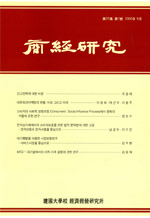한국, 일본, 대만의 경제발전에서의 儒敎의 역할
The Role of Confucianism of The Economic DEvelopment in South Korea, Janpan, Taiwan
- 건국대학교 경제경영연구소
- 상경연구
- 제22권 제2호
-
1997.1273 - 90 (18 pages)
- 15

Western economist observed that there was a absence of capitalism as an ideology in East Asia. They explained that Confucianism had created and perpetuated Asia’s major social institutions and practices, all of which had stifling effects on the development of capitalism. Hence, Western-style capitalism had failed to emerge in Asia. They identified these social institutions and practices as the patrimonial political structure and ideology, an unyielding traditionalism in state affairs which was reinforced by gigantic and cumbersome bureaucracy which was originally established to collect and allocate taxes, the close-it family sib and its constrictive effects on its members’ freedom and creativity, and the concept of the genteel as being a perfect product of Confucian education. They asserted that the emergence of capitalism in Western culture was historically unique and owed its ideological origin to Protestant ethics as formed during the Reformation. After World War Ⅱ, casual observers and economists have observed a similar work ethic, high energy level, and keen competitiveness among business people in South Korea, Japan, and Taiwan where Confucianism has had a profound influence on the local culture. The economic success of these countries is the very influence of the Confucian philosophy. The industrial capitalism operating in the Far Eastern countries appears to be no different from that which function in the West. South Korea’s, Japan’s. and Taiwan’s economy has even outstripped Western industrial economics in some respects. There came from the fact that Confucianism imparted a set of ethical principles that were almost identical to that of the sixteenth-century Protestant- diligence, frugality, creditability, honesty, rationaligation, and self-control. The Confucian’s moral obligation to ascetic discipline was as strong and deep as the sixteenth-century Protestant’s sense of commitment to an inner worldly ascetic life worthy of the saved persons. So Capitalism found its way into the far Eastern countries’ culture and had to be in harmony with Confucian philosophy. As a result, high saving ratio, emphasis on the education - investment on the human capital, fairly income distribution, and government intervention in private economy were considered as a common characteristics in the economic development of Far Eastern countries, notably South Korea, Japan, and Taiwan.
Ⅰ. 序論
Ⅱ. 儒敎의 非資本主義的 性格
Ⅲ. 일본ㆍ남한ㆍ대만의 경제발전과 儒敎
Ⅳ. 要約 및 結論
참고문헌
Abstract
(0)
(0)